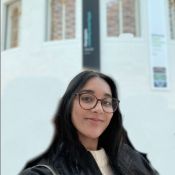
I couldn’t be more pleased
Hi! My name is Alexis, a student from Canada almost done completing my master’s degree in Public Health in Chester, England. As a mature student, it was a big deal for me to quit my job back in Canada, get rid of my apartment and car, and fit everything I would need for 12 months into 2 suitcases. Also, as a mature student, packing my bags and choosing to study abroad in England with the help of Across the Pond was one of the best choices I have made yet.
I am a very studious and academic person, but also have a huge love for the outdoors and exploring. Studying in England has allowed me to get the best of both. Chester is an ancient Roman walled city on the North Welsh border, with transport links getting me to the Welsh mountains in under 2 hours. In my spare time, myself and my new friends travel into the mountains regularly for some much needed stress relief from our studies.
Studying in England at a Post Graduate level was a big adjustment to me compared to the North American University school system. There is much less time in the classroom and lectures compared to the University system I am used to, and the grading system is completely different. The first time I got an assignment grade back and received a 65% I was very disappointed, but after some help from my peers I realized a 65% in the English school system is not such a bad thing. I wish I knew about this difference beforehand, so this is my advice to you; make sure you understand the grading system fully before getting upset or excited about how you have done on your first assignment abroad!
All in all, as I reflect on my time here in Chester, I couldn’t be more pleased with my choice to come to England, and I couldn’t have made it here without the help of Across the Pond. My Student Advisor helped me decide what universities I might be interested in based on my program of study and personal interests, helped me at all stages of the application process (including writing an application essay!), and even shared scholarship offers with me. Across the Pond is an amazing organisation, who helped turn the big deal of packing my bags and moving abroad into something achievable and memorable for the rest of my life.
- Alexis

Taking in a new world
I have had a dream of living abroad for most of my life and three years ago, decided to take the plunge to apply to graduate school in a foreign country. During my time in the USA, I had lived in all different regions of the country, but eventually I wanted to challenge myself by living in an entirely new place. I am an American artist and knew I wanted to work as an art therapist, applying my love of creativity with a helping profession. After doing research, I realized the UK had many Art Psychotherapy programs and that there was no fee to apply. Furthermore, I found Across the Pond services and linked up with a representative who helped me through the application process. I applied to five graduate schools and chose to study at Roehampton University because it was in an idyllic part of London and had a wide offering of creative play therapy programs. I was drawn to the ideas of the culture, food, art, music, and history in London. London ended up far exceeding my expectations!
I arrived in the UK sight unseen, never having been to Europe, overjoyed and excited to begin my course. My visa had been delayed and I had a flight rescheduled, but staff at Roehampton and Across the Pond helped me through the process. Knowing no one in a new country, I opted to live in the dorms.
My campus was gorgeous. I lived near a chicken coop and visited the ducks and wildlife on the university’s ponds. One time I even saw a swan! I learned all about how swans in England were protected property of the Queen and spent time strolling along small bridges looking at the rivers. Many of the graduate students in my accommodation were also visa holders, so they would make Spanish tortilla or other dishes from their home countries. I learned a lot about the world through food and conversation. It was also convenient that the library was around the corner for late night study sessions.
One thing I really loved about my course at Roehampton was my fellow cohort of students. My British friends taught me all the local slang and took me to a diner to try a proper full English breakfast. My program was filled with interesting people from a variety of backgrounds who brought their unique passion for creativity and caregiving to their studies. We made collaborative art in varied workshops and practiced a group therapy dynamic that lasted for weeks and led to interesting discoveries. I had to adjust to the grading system and realize it was on a very different scale than what I knew of in America. Additionally, a lot of the university work was very self-guided. A big lesson from the course was sitting with uncertainty, especially when the university changed the program requirements for future students. Our tutors were invested in student success and did a great job guiding my class throughout this process. Friday studio days were fun. A small group of students brought snacks and worked on independent projects or the solo painting project we worked on throughout the year. I had the opportunity to work on a placement at a secondary school, counselling teenagers and learning about the intricacies of the British education system. All the relationships I made during this time were invaluable.
There were so many unexpected things about British culture, history, and architecture that I found charming. I enjoyed the fresh food and grocery shopping at the co-ops. Some of my best friends were Irish and had me over to their home for a Sunday roast. I was able to take two train trips to Brighton, the LGBTQ+ capital of the UK. We went to pubs, clubs, and hung out on the rock covered beaches. In my spare time from uni, I traveled to different parts of Europe I had never been, including Germany, Italy, and France. I was impressed by how many UNESCO World Heritage sites I had learned about in primary school and then saw on my travels. I was able to visit the Louvre, Uffizi, and Jewish Museum and take in so much art and world history. It was a once in a lifetime opportunity for a girl from cornfields of the Midwest.
Travel was a large part of my education alongside my studies. I loved attending Pride in Paris and London. I felt very safe in the UK, as gun violence was not an issue. I was impressed by laws being implemented to strive for equality and climate consciousness. Though life grew to be busy as a grad student, I felt very much at ease in Europe. My father was diagnosed with cancer toward the end of my first year of university. After a trip home, I chose to defer for another year. The university assisted me in this process. I will be returning this autumn and I can’t wait; it is a place I have fallen in love with. Across the Pond is helping me make sure I have all the important pieces in order. I am forever thankful for their assistance, as I was an older student returning to graduate school and I have had a remarkable experience. My dream is to finish my degree and practice art therapy in the UK, hopefully building a home in Europe for as long as possible. Ideally, I will be able to work with a variety of populations within the NHS and outside charities to give people the gift of using creativity therapeutically. I feel fortunate to have taken this risk and for all the assistance in my journey of pursuing my goals and education.
- Nicole

Living in London, UK

Originally from Vancouver, Canada, I chose to pursue studies in the UK to experience life in a different part of the world. It has been a wonderful experience so far, learning about the difference in culture and experiencing so many new things. I love that there is always something to do in London.
Studying Forensic Science
My chosen MSc in Forensic Science was a great choice for me to learn more about a topic I am passionate about. There aren’t many options back home, so being able to student Forensic Science in London has been a dream! The university has many resources for our course, and I am thankful to have chosen Kingston University.
UK Grading Scheme
Studies in the UK are slightly different than they are from back home. The biggest difference I noticed is the grading scale compared to my Canadian University. In the UK, it is rare to receive above 80% on exams and coursework. A 70% is considered a distinction. Back home those just sound like average grades but here they are fantastic! My course has an average of 55% and this is quite normal across the university. I do feel that my previous studies in Canada have well prepared me for the changes to the grading scale here.
- Melissa

Amazing world-class universities with professors from all around the world

I decided to move to the UK for my master’s degree as I wanted to visit the country for a long time due to my interest in exploring the culture and beautiful architecture. Knowing that the tuition cost would be very close to a Canadian University also helped my decision to move to the UK. Furthermore, the UK is known for having amazing world-class universities with professors from all around the world.
Exploring Historic Oxford
Oxford is a fantastic student city where you will always have something to see or do as there is something for everyone. You can take an amazing tour of the historic University of Oxford and visit locations where the Harry Potter movies were filmed. The city has many museums such as the Ashmolean but if that’s not your thing you can visit the botanical gardens or go punting in the Thames. Cowley Road contains many of the best restaurants that offer cuisine from around the world, and the nightlife is great for those nights out with friends. My favourite part of Oxford is the fact that the whole city is bike accessible, and anything is only a 5–10-minute bike ride away, giving it the name “Cycle City”.
Student Life at Oxford Brookes
Oxford Brookes is an excellent University with the most knowledgeable and compassionate instructors I have ever encountered. When it comes to facilities for those enrolled in a nursing or rehabilitation medicine program, the university has multiple state-of-the-art simulation suites with all the best technology and equipment you can imagine. Oxford is so diverse as the university attracts students from around the world, so becoming immersed in various cultures and finding new friendships is easy.
Relaxing & Quiet Accommodation
Since Oxford is a student city, there is plenty of student accommodation. Many options exist, from living in a house share with friends to a single-person studio flat. Living in University accommodation has been a great experience. Most rooms are ensuite, so you get your own washroom while sharing a living room and kitchen. The experience is relaxing after a long day of lectures and quiet at night due to building nighttime restrictions. The facilities are also close to grocery stores, restaurants and parks.
Amazing Experience with Across the Pond Advisor
My experience using Across the Pond was amazing; my advisor was beneficial and resourceful. She assisted me with the application process, applying for a student visa and answered all my questions and inquiries as soon as possible. She even took time out of her schedule to revise my personal statement, as it is an important part of the application process. I highly recommend using Across the Pond when applying to a UK university.
- Ahmed

Studying abroad is a once in a lifetime experience!

Applying to study in the UK was without a doubt the most stressful part of my experience as an international student. Not moving to another country and not earning the degree itself, but the application process. The entire process can feel quite overwhelming because there are so many steps and details to stay on top of. Also, I knew I wanted to study in London more than anything, which just added to the pressure I felt when applying. “What if I don’t get in? What if my visa application gets rejected?” All of these “what if’s” that kept running through my head and totally stressed me out beyond belief. But in the end, all of my stress proved to be completely unnecessary because everything worked out just fine!
While there are a lot of moving parts to keep track of when applying to universities abroad (the actual university application, the student visa application, the biometrics appointment, etc), if you stay organized and diligent, I promise everything will come together! Having the support and guidance of my Across the Pond advisor was also such a blessing - I’m not sure how I would have done it without them! They helped me navigate the entire process, answered any and all questions that I had (and I had a lot!), helped me to submit my applications, offered informative webinars on the visa process, and even proofread my personal statement for me!
Choosing My University
I did a lot of research when deciding what schools to apply to in the UK. For such a small country, they sure do have a lot of schools! I started my research with a quick Google of what UK schools even offered the course that I was interested in. Since my desired course was fairly rare, this actually helped to narrow down my search quite a bit. From there, I scoured each university’s website to learn as much as I could about the school and the course itself.
In the end, I applied to five schools. Something that was really great is that there are no application fees for UK schools like there are in the US, so you can really apply for as many as you want! I was fortunate enough to get accepted to all five schools that I applied to, so then actually deciding which offer to accept was when the more intense research came into play.
My final decision was made based on three main factors:
1. Location. I knew I would never survive in the north of England since the winters up there
can be pretty brutal, so I definitely wanted to be somewhere more south. I also knew I wanted to be close to London. It’s a city that I’ve idolized since I was a teenager, and I had dreamt about living in or close to London for years.
2. Price. On average, universities in the UK are quite a bit cheaper than universities in the US. At the same time, as an international student, you typically have to pay significantly more than you would have to if you were a UK citizen. Because of the fact that I was entirely self-funding my studies and my move to the UK, I had to be extremely conscious of tuition prices. Something to keep in mind is that when applying for the visa, you may have to demonstrate “proof of funds” - essentially that you have enough money to support yourself while living and studying in the UK on top of paying your tuition fees. If you choose a university in London, you may also have to prove that you have more money available than if you chose a university outside of London since it is an expensive city to live in.
3. Course offerings. Something I was very conscious of is the fact that I didn’t want to come to the UK, get my degree, and then have to immediately move back to the US. While the UK did recently implement a “graduate visa” which allows people who graduate from a UK university to stay in the country for two additional years after graduating regardless of working status, I wanted to maximize my time in the UK as much as possible. One of the schools that I was accepted to offered a Professional Placement Year for my course. Essentially, this is a one year paid internship that gets you work experience in a field relevant to your degree. It gives you an additional year in the UK on your same student visa, except you are mostly just working and getting paid instead of attending classes.
With all of these factors in mind, I ended up choosing Kingston University London and I couldn’t be more happy with my decision!
What I Study
I study MSc Occupational & Business Psychology at Kingston University. I took a fairly winding journey to arrive at this course, which was something that I had never even heard of just a few months before applying for it.
My undergrad degree is in Business Administration with a concentration in Marketing Management and a minor in Psychology. Psychology has always been my real passion, but I had always struggled to see how to make a career out of it. In my mind at the time, I was under the impression that if you studied psychology you had to become a therapist. So I ended up taking the “practical” route and studying business.
After graduating, I worked for four years in the marketing and communications field. During this time, I really struggled with the impersonal corporate environments. It always felt as if the employees, the actual people making the company run, were viewed as so much less important than money. Profits always took precedence over people, and that always bothered me.
Eventually, I ended up getting laid off from my corporate marketing job, which forced me to really reevaluate my career choices. I decided I wanted to do something that I was actually passionate about and something that I felt would make a real positive impact on the world. At the same time, I wanted to do something that would allow me to get back to my interest in psychology, which is how I came to Occupational & Business Psychology.
This is a fairly new industry, and every single time I tell someone what I study, I have to explain what it means. At the most basic level, it is about how we can make work better for the workers. How we can improve the relationship between employees and the companies they work for. This includes a wide range of topics, from employee wellbeing and recruitment to learning and development and consultancy.
I feel like I’ve really found the sweet spot that balances my professional skills with my personal passions, and am so glad that I took the leap to go back to school and pursue a career change!
UK vs US Student Life
As you would expect, there are a lot of differences between student life in the UK versus in the US. To start, the grading system is completely different. In the US, of course it is very straightforward, with 59% and below failing, 60-69% a D, 70-79% a C, 80-89% a B, and 90-100% an A. In the UK, on the other hand, you can pass with any grade that is 50% and above and it is extremely rare to get anything over an 80%. In the US, I would have been so upset to get a grade that was anywhere in the 60’s, but in the UK, getting a grade in the 60’s means that you actually did well! If you get above a 70% you did extremely well, and if you get anything above an 80% you might as well be a genius. This took a while for me to get used to!
Also, in the UK you do not need to register for classes each semester like you do in the US! You are automatically enrolled into the modules that you need to take and given a predetermined schedule. I really appreciated not having to go through the stress of registering each semester and worrying if my classes would fill up!
Another key difference is that it is totally normal to call your professors by their first names in the UK. It is not at all expected that you should call them Professor whatever their last name is. This also took me a while to adjust to and to convince myself that I wasn’t being disrespectful by calling my professor by their first name!
There are definitely a lot more differences between UK and US student life than just these three, but I will leave it at that for now. Honestly, a lot of the fun of it is finding out what the differences are and learning to adjust!
What I Love About London
London is one of the most amazing cities in the world as far as I’m concerned, and I could not be happier living here. I feel like you could live in London for an entire decade and still not experience everything that there is to do here! The amount of incredible restaurants, pubs, parks, shows, and entertainment is mind blowing. I have tried so many new foods at amazing restaurants, seen so many concerts at such incredible venues, seen so many impressive plays and musicals, had picnics in so many gorgeous parks, and so much more. I feel like I can live such a rich and cultured life here.
One of my favorite parts of London is also how easy it is to travel from here. In the US, taking a trip to Europe would take hours, if not days, of travel and easily several thousand dollars. Now, living in London, I have actually taken weekend trips to Spain and Italy for only a few hundred pounds, which still is just completely mind blowing to me!
Living in London definitely comes with its challenges. It can be extremely expensive and crowded, for example. But overall, I can’t think of a better place to live. I have seen and experienced more living here for the last year than I have in probably twenty years living in my hometown in the US.
Challenges of Living Abroad
Moving abroad and studying internationally is without a doubt the best decision I have ever made. I have grown so much as a person and have experienced so many new things and met so many wonderful people. I would do it all again in a heartbeat. But, that is not to say that it hasn’t been without challenges.
For me, the toughest part of living in the UK is the sheer distance from all of my loved ones back home. Not only am I 5,000 miles and an expensive 11 hour flight away from all of my family and friends, but there is also an 8-hour time difference between London and home. It is difficult not being able to see them in person, but the time difference even makes it hard to talk on the phone or FaceTime at times. I am an extremely independent person, so most of the time this distance is totally manageable, with technology making it even easier to communicate, but when I’ve found it to be the most challenging is when there were family issues back home. Within my first few months in London, there were several things that happened with my family back home that it was extremely difficult to be so far away for, and not be able to afford to come back for.
Also, most of the time living abroad I have found the cultural differences to be exciting and interesting to discover and navigate. Like the first time taking public transport or the first time shopping for groceries with foreign brands, for example. However, sometimes when I have been stressed or in a hurry, not having a firm grasp of how to get around in this foreign country could get extremely frustrating. A few times, after a hard day, I remember wanting to just get in my car, stop at a drive thru for some fast food, and go straight home. But instead I had to navigate public transport, search for food at some restaurant I hadn’t heard of, and do a lot of things that were quite challenging when in the moment I just wanted something easy and familiar. Going to a grocery store and not recognizing any of the brands, not having any clue which bus will get you home, or not knowing what store you can go to to buy something basic after you have had a long and stressful day is not ideal! Of course, this did subside after a few months when I became more familiar with everything, but I do remember feeling quite overwhelmed a few times after first moving here.
Something else I have struggled with at times is the weather. I come from the west coast of the United States where the weather is typically dry and sunny, so moving to the UK where it is usually very wet and cold was quite an adjustment! I had to completely redo my entire wardrobe (I didn’t even own a real coat before coming here!) and get used to bringing an umbrella wherever I went. But I do have to say that it doesn’t rain here nearly as much as I expected it to (although it does still rain a lot). It also makes you really appreciate the sun when it does come out. Summers in London are absolutely amazing.
My Top Tip
Moving abroad can bring about a lot of different emotions - excitement, nervousness, uncertainty, maybe even doubt. Above all, my top tip is to embrace every emotion and really let yourself be vulnerable. You will be forced out of your comfort zone more times than you can count, and it will turn you into such a better person for it with a much wider perspective of the world. Try everything and talk to everyone. Don’t be afraid of not knowing what you’re doing all the time. I have met some of my closest friends by starting a conversation with strangers on my first day of classes. I have explored some of the most amazing places by wandering around London without a plan. Let yourself be vulnerable and try every new thing you can! Studying abroad is a once in a lifetime experience. You want to make sure you make the most of it!
- Morgan











